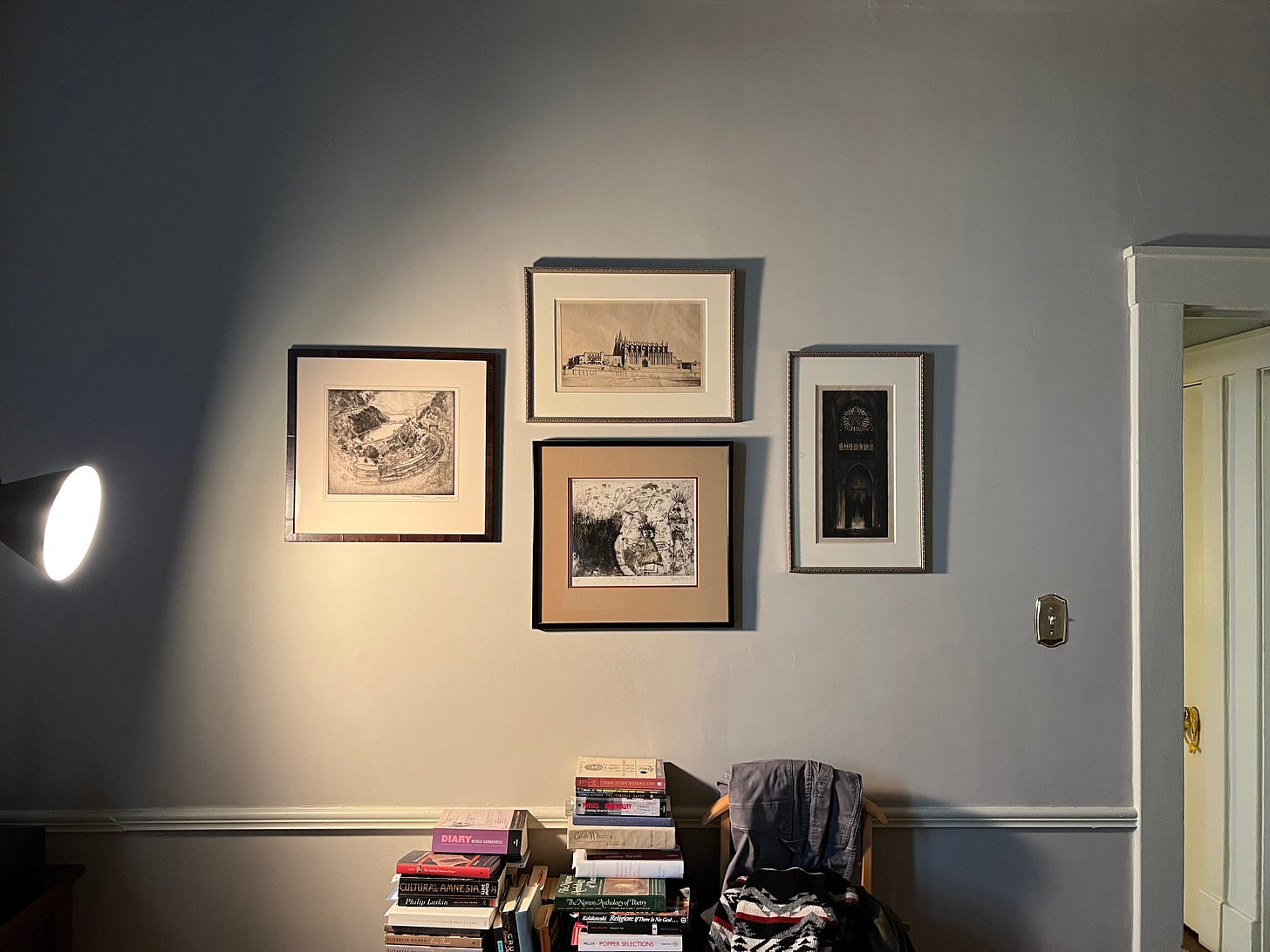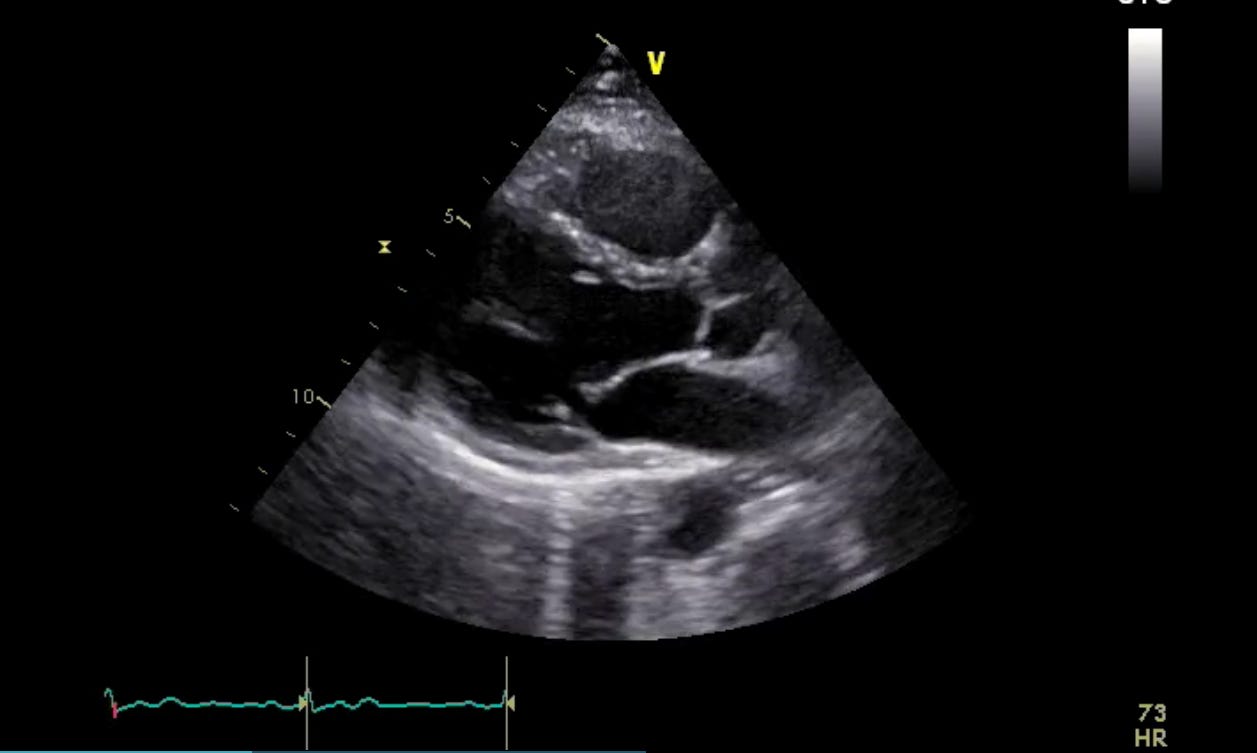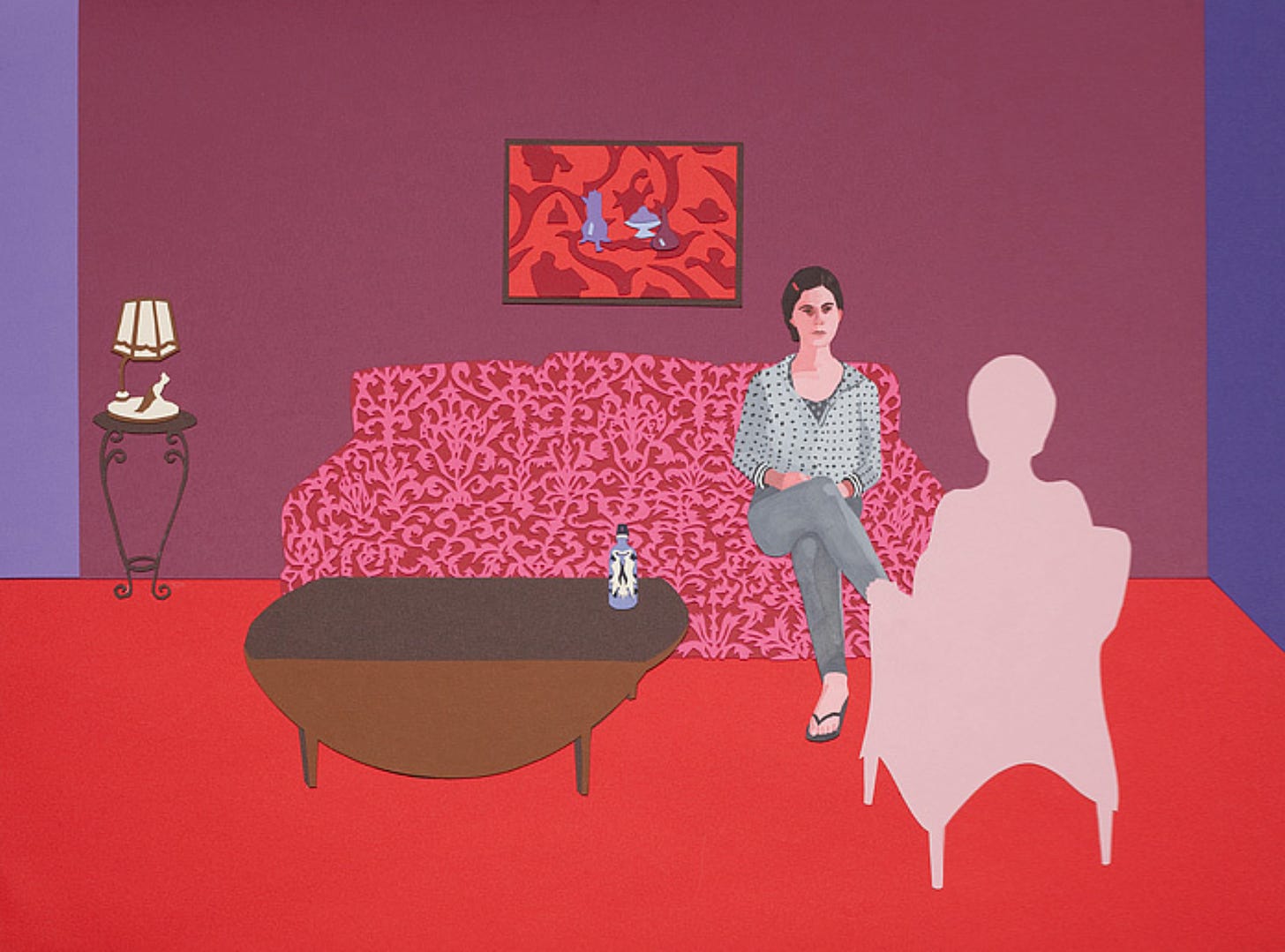New Orleans remains New Orleans: another world, a place where one cannot help but lose track of everything beyond its borders, “the city that care forgot” which also forgets everyone, everything, and everywhere beyond its borders.
I. My father’s art
On this trip, I sleep in my father’s bed, in his bedroom, surrounded by his remaining “personal effects”: his books, his clothes, the art he chose for his walls. His taste was dark in the literal meaning of the word: sketches of cathedral naves in shadow, paintings of silhouetted figures at dawn or dusk in dense fields of foliage, abstract shapes in very physical strokes of black.
While he was alive, his presence occluded my view of these artifacts; he simply was, so they simply were. Now that he’s not, I can see that they might also be not, and so their existence and selection is suddenly more overt and urgently curious. It’s impossible not to wonder how he looked at them, what he saw, what they meant to him; I’m not even sure, I now realize, what he thought the purpose of art, or decoration for that matter, was. Staring at the walls, I don’t uncover anything. It is obvious that the man I knew is not here anymore, but it’s taken me longer to understand that the man I didn’t know is the greater absence: the man I never knew and now never can. I wish I’d asked him what he thought of all these pieces. I cannot imagine how or even whether he’d have answered.
II. My mother’s heart
My mother said to me last night:
“I had an appointment recently. They did a sonogram on my heart, and I could see it on the screen. It was awful. [Voice breaking for a moment, then recovering]. To see it working so hard. Working that hard your whole life, always working to keep you alive, day in and day out. I didn’t like watching it. It felt like an invasion of privacy. I wanted to say ‘I’m sorry little heart.’”
She persuaded me: I now feel acutely sorry for my heart, and I suppose as bad about the plight of every one of my organs. The heart as under-appreciated, tireless little spirit laboring on your behalf, neglected in your chest is very much the sort of narrative metaphor to which my mother has always been attracted. Although it is her mental habit to perceive mostly injustices of various kinds wherever she looks, they all strike her as stupid rather than tragic, and arouse contempt in her for the villains rather than compassion for the victims. My mother believes herself to be good and right, and is strong; so she feels competitive wrath for those who are evil or wrong, and intellectual distance from those who are weakened. Interpersonally, it’s another matter: she’s very generous and warm to individuals, perhaps to a fault, or at least far beyond the expectations of normative morality. She’s the kind of person who gets involved. Someone has to stand up for the neglected heart, the lost soul, the abandoned child, and she likes to.
But intellectually in her decrepitude, she is mostly scornful: about her friends, about family, about the strange assortment of news stories that catch her eye, which seem to share no particular theme. I have the sense that she’s angrier than she once was, but I can’t quite tell at what; although her slide into irascibility started before he died, I still suspect she’s at least partly angry at my father for killing himself. I mentioned as much to her, but she quickly and casually denied it, explaining that he was in such agony at the end of his life that she couldn’t possibly feel anger towards him.
I didn’t say what I thought: that the soundness of his decision doesn’t have that much to do with whether or not we feel anger; we are people, too, and are allowed to have “irrational” reactions or reactions we ourselves do not approve of. But I kept it to myself, not because I thought she’d reject it —she wouldn’t— but because for her to admit that she is angry would be wholly incompatible with her values as well as the image she has of herself, and the older I get, the more it seems simply rude to put someone in that sort of position. Something my mother and I have in common is a subtle technique for always being okay, no matter what happens in this violent, chaotic world: simply always be okay with whatever happens in this violent, chaotic world. You know: be okay. Whatever it takes.
Seeing her heart might have reminded her of the toll. To think of it in there, beating for you, while you betray yourself again and again —for other parts of yourself, for other people, for no one at all— is affecting. Better not to look. That’s what it takes.
III. Men will literally post to avoid therapy
It is impossible to lose a parent, or deal with almost any family situation, or use the Internet for any purpose, without encountering something we might call therapism: the widespread belief that something called “therapy” exists which has dispositive answers for most if not all of life’s questions, including and especially politico-moral-philosophical questions.
An entire book could be, and probably has been, written about our complicated psychoanalytic inheritance. “Everyone knows” Freud is discredited, but no one has abandoned basically Freudian modes of investigation; even as few believe that “women have penis envy” or “men want to fuck their mothers,” everyone continues trying to locate the “source” of anything they consider problematic or defective in little family stories with shifting morals, in mechanisms like “repression” or “avoidance,” and so on. Whatever little merit remains to these concepts, they have almost no empirical validation in scientific literature.1 Subsequent paradigms have not fared that much better. Nevertheless, one sees countless disputes online that end with people asking “who hurt you?” (smuggling in the absurd theory that only through being wounded could someone arrive at positions we oppose), or advising that someone “needs therapy” (as though therapy reliably produces results we can anticipate, results that will reduce disagreement in our massive populations).
My old psychiatrist saved my life many times over, and indeed gave me a life worth living, one I never imagined possible for someone as sick as I was. I take my prescriptions without fail and comply with all treatment regimens, and I would never deny that therapy can be as positive and profound a force for good as exists for the individual; our conversations changed me for the better and I am in her debt permanently. But I recoil at our absolutely endless search for crypto-objectivism, of which the unsound exaggeration of therapy’s value is but one instance. Americans, at least, are always looking for new ways to say “saintly” and “sinful”; many today say “healthy” and “toxic” so they can conceal from themselves the extent to which they’re engaged in the same old Puritanism, the same old search for sacred texts to guide us, the same old quest for priestly figures to assure them that they’re good and others are not.
Therapy can change lives, but this is not because it is a body of knowledge that can adjudicate right and wrong or good and evil; it is not because therapists know how we should live, or who we should be, or what’s moral, just, or important; it is not the case that psychology can produce oughts from ises, and it’s not even the case that psychology has many ises to proceed from. Both the is-ought problem and the replication crisis are devastating to any view of psychology as a “source of wisdom” or “meaning.” At the most fundamental level, never forget that no one has a theory for how the mind works as a physical system, and all other theories —Freudianism, systems therapy, everything— are merely stacks of conjectural metaphors with very little grounding. Within my lifetime, nearly every major “mental illness” has been renamed and has had its diagnostic criteria shifted! Merely decades ago, psychologists by the thousands believed that the lobotomy was a sound procedure! Do not look to this castle on the sand, this often faddish black market for contraband moral certainty, for more than it can provide!2
Therapy is useful when it is useful because it is good to have someone else you trust assessing your life, your choices, and the stories you tell yourself. It can be better or worse depending on the individual doing so —scores of variables matter in isolation, and many more when considering compatibility with the patient and their present needs and dilemmas; far too many to call practice field “scientific”— and on the sources they draw from. I think many traditional sources in the field are very valuable, from the medical / empirical work that has been accomplished to the theoretical / speculative work that, even when I think in error, is at least an effort at useful philosophies of mind. But even admitting that e.g. reading Jung or working with a Jungian can be profound based on the knowledge it conveys, I still maintain that the mere relationship is the primary level for therapy’s value, the configuration and act of one person reporting to another person about their life and getting feedback.
And anyway, the best therapists and psychiatrists have an array of potential lenses to apply, based on “whatever works” for their patient. Note that this array means that there is no objectivism to be found here. There are no compulsorily true answers in therapy. It is not “a way.” The best therapists are tinkerers, probers, closer to “mechanics for your psychic engine” than “authorities on how humans should live.” And the best therapists are rare. Much more common are ordinarily flawed, projecting, inattentive, unimaginative therapists who over-index on the fashions in their field and waste the time and money of their clients, shoehorning them into whatever momentary fixation of the discourse.
As with questions of cosmology, the point is not that there is nothing of value in their work. I say again: therapists have saved my life. The point is that
therapists have no better idea than you how a human should live, what she should believe, or what is best or worst in this life;
therapy does not produce “right-thinking people,” or homogenized populations of aligned individuals who all feel or think the same way; and
therapy is not about some validated, authoritative body of knowledge, and what knowledge it does have is questionably “scientific,” lacking almost any explanatory physical models.
Therapy cannot tell you “what the point of a relationship is,” or “how one should think about death,” or “what is best for one’s country,” or “how we ought to treat each other.” It can help you sort out what you think the point of relationships should be, how you might try thinking about death, perhaps why you have the opinions you do about politics, maybe how you ought to treat others, all of which will depend on knowledge —or beliefs, or values— utterly unrelated to therapy. If you happen to have what we currently —but probably not for long!— call “mental illness,” it can also help you manage symptoms, settle on various treatments and interventions, and construct a life compatible with your limitations. That’s more than enough for us to consider therapy immensely valuable.3
But it is far less than what many think it can do: reform everyone into “health” —a dubious concept when applied to mind— or eradicate evil. I’ve seen people claim, for example, that criminals merely require therapy, something only someone who’s never known a real criminal could believe and yet another metamorphosis of Rousseauian naïveté; while it was tolerable for a French intellectual with no experience to believe that
...nothing is so gentle as man in his primitive state, when placed by nature at an equal distance from the stupidity of brutes and the fatal enlightenment of civil man…
it is hardly something I can forgive in anyone with access to our much-improved histories and anthropologies. Humans are not innately good, ruined only by family and society, and easily rescued from evil (or variance) by conversations with educated experts and maybe some pills. To fantasize otherwise is merely to regress to a colonial universalism: as though once we rear the brutes right, in our schools and with our authorities, they’ll all gratefully fall in line. If all you have is texts, every problem looks like one of ignorance.
I don’t know that therapists or psychologists or psychiatrists bear much blame for the misinterpretation of their work. While scores of them have indeed overreached —it’s trivially easy to find weak political science theses wrapped in the language of the field— I’m sure the great majority do not. Rather, I fault us: we seekers who transform everything into religion, we of the species Mircea Eliade called homo religiosus (emphasis on the sus). I eagerly defend religious belief as such and specific religious beliefs of many kinds, but part of why I do so is that religions possess much that therapy does not: real scaled Schelling points, for starters, but also in most cases centuries of history in which selection pressures winnowed their claims to what seemed to work best for the most. I have high hopes for the future of psychology, and regard studying it —including Freud— as one of the most useful things one can do. But it really is just another provisional perspective, and the older I get, the less I feel it has to tell me beyond rather basic points like: eat regularly, sleep adequately, and be careful about sleeping in your dead father’s bed: it can make your mornings somewhat moody!
Everything I’ve read suggests that your genes absolutely trounce your upbringing in terms of “who you are,” and that short of severe abuse and severe neglect it’s unlikely your parents shaped your personality as much as you think. The illusion that they did is rather because they have the same genes as you do. I didn’t “learn” anger from my mother; my mother and I share the curse of temper.
Balancing the fact that “you must take therapy seriously” with the fact that it is epistemologically absurd is challenging, and I think animates much discomfort with therapy as-such. I’ve written before about how I feel about this.
There are also pathways to this work outside of Western therapy, of course, too many to mention! And if you cannot find a therapist or a guru or a mentor, you can even approximate some of it all by yourself, though outside eyes are invaluable.








Emphasis on the sus
In addition to eating regularly and sleeping adequately, I recommend walking 10,000 steps per day (ideally with direct sun exposure) and lifting several times a week. Hugging your child and spouse are awesome too. Plus Substack of course. That's all the therapy I need.